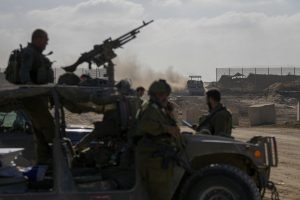For people living in or engaged with the Asia-Pacific, the violence in Gaza and the accompanying rhetoric are all too familiar, mirroring much of what Myanmar’s military has unleashed against ethnic minorities for decades.
Being forced to live in “open air prisons” matched by systematic dehumanization and state-backed violence are exactly what the Rohingya of Rakhine State have experienced at the hands of Myanmar’s military. The insurgent attacks by the Arakan Rohingya Salvation Army (ARSA) on August 25, 2017, triggered the military’s euphemistically called “clearance operations” that resulted in the violent displacement of over 700,000 Rohingya into Bangladesh. The military justified the atrocities as a form of self-defense aimed at protecting the nation, but the offensive was quickly labelled a “textbook case of ethnic cleansing” by the United Nations.
The international response was painstakingly slow, but it was near unanimous in its condemnation, even at the fractious U.N. Security Council. By 2022, the United States had declared the military’s actions as genocide.
Israel is now deploying a similar dehumanizing discourse about Palestinians as it begins “ground operations” that, following the forced displacement of over 1.4 million people, are strikingly similar to the Myanmar military’s “clearance operations” against the Rohingya. While this should result in a similar level of condemnation, the international response could not be more different. This has major implications for the Asia-Pacific and for global governance writ large.
A growing body of commentary and analysis is highlighting the jarring double standards in the international, predominantly Western, response to Israel’s actions. Comparisons are being drawn with Ukraine, both in terms of political action and media portrayals, and how this relates to the dehumanization of Palestinians. What are painted as innocent civilians in the former case have become collateral damage in the latter.
The contrast to the genocide in Myanmar offers an even starker incongruence in Western responses; no state stood “shoulder to shoulder” with the Myanmar military, as the scale of atrocities quickly became evident. Like ARSA’s attack, Hamas’ violence does not exist in a historical vacuum, nor does it justify such a disproportionate response.
Over the past month, the U.S. has displayed extreme double standards, initially refusing to back even a “humanitarian pause,” let alone an urgently needed ceasefire, with only lip service paid to the humanitarian crisis inside Gaza. The U.S. is not alone, as Australia and the U.K. abstained from supporting a truce. Tellingly, all three nations were aligned in the illegal invasion of Iraq. Instead, Biden’s questioning of fatality figures from recent Israeli attacks replicates the disinformation tactics used by Myanmar’s military during the violent exodus of Rohingya.
Such actions have important ramifications for the Asia-Pacific that cannot be dismissed as anomalies during a time of crisis. Just as Australia’s abhorrent offshore detention system greatly undermines its moral legitimacy in the region, so too does the current unqualified Western backing of Israel. Efforts to bring Myanmar’s military to justice and end junta rule will suffer, while any principled stance on China’s actions in Xinjiang will ring hollow.
This is nothing new for the region, and simply revives memories of past injustices, such as Washington’s political support for and arming of Cambodia’s Khmer Rouge regime after its overthrow in 1979, prolonging civil war and extreme hardship for millions of Cambodians. The world didn’t require the benefits of hindsight to recognize that allowing the Khmer Rouge to occupy Cambodia’s seat at the U.N was obscene, yet that’s what happened for more than a decade after the end of its murderous rule. Such contradictions reverberate generations later; during his 38 years in power, Cambodia’s former prime minister Hun Sen routinely referenced them in order to deflect Western criticism, even as he eviscerated his country’s civil and political freedoms.
Rather than being tenuous, the links between Israel, Myanmar, and Cambodia are demonstrative of the failure of international systems of governance, particularly the U.N. architecture. After the end of the Cold War, the world declared that it would “never again” allow genocide to occur, but as a U.N. official quipped in 2018, “never again” has since become “time and again.”
At the macro level, particularly the Security Council, the U.N. saps considerable diplomatic efforts and global attention, but achieves little. It dithers on holding Israel to account, while even unanimity on Myanmar has failed to deter continuing military atrocities, which have worsened since the military coup of 2021.
In other domains, such as humanitarian response, it is an abyss for vast sums of money, but eschews taking a principled position. The latter is evident in the U.N.’s legitimization of the Myanmar junta, in its desire to preserve its “access,” while domestic civil society actors lead the humanitarian response and pursuit of justice.
There are always many institutions and individuals with an interest in sustaining the status quo, but the mounting “never again” crises demand not reform, but a reckoning. The U.S. and the Western states lining up with unqualified support for Israel would do well to recognize the global ramifications of their actions. For those pursuing justice in the Asia-Pacific, the current state of affairs reinforces the importance of domestically-led resistance, from Myanmar’s dynamic anti-coup revolution to Cambodia’s award-winning environmentalists. In a vacuum of so-called “global leadership,” it is such leaders that are proving far more adept at advancing justice through solidarity movements and principled action.

































